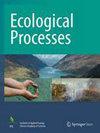Will fire-smart landscape management buffer the effects of climate and land-use changes on fire regimes?
IF 3.9
2区 环境科学与生态学
Q1 ECOLOGY
引用次数: 0
Abstract
Long-term farmland abandonment has increased fuel build-up in many Euro-Mediterranean mountainous regions. The high fuel hazard in these landscapes, combined with ongoing climate change, is increasing the frequency of extreme wildfires, thus altering contemporary fire regimes. Mitigating the loss of the landscape’s capacity to regulate large and intense fires is crucial to prevent future harmful effects of fires. As such, effective strategies to manage these fire-prone landscapes are needed. Yet, further understanding of their performance under global change scenarios is required. This study assessed the effects of fire-smart management strategies on future landscape dynamics, fire regulation capacity (FRC), and fire regime in a Mediterranean fire-prone mountainous landscape in Portugal (30,650 ha) undergoing long-term land abandonment and climate change scenarios. For that, we applied the LANDIS-II model under climate change scenarios (RCP 4.5 and 8.5) and long-term farmland abandonment (2020–2050) according to three fire-smart management strategies focused on fire prevention compared with a business-as-usual (BAU) strategy based on fire suppression. Future fire activity and land dynamics resulted in changes that fostered landscape heterogeneity and fragmentation and favoured fire-adapted forests and agroforestry systems while decreasing the dominance of shrublands and croplands. FRC decreased over time, particularly under RCP 8.5 and the BAU strategy. In turn, fire-smart strategies better prevented large and intense fires than the BAU strategy, but their effectiveness decreased under RCP 8.5. The loss of FRC resulted in increased burned area and fire frequency, which predicts a shift from contemporary fire regimes but more markedly under RCP 8.5 and in the BAU strategy. Fire-smart strategies outperformed BAU in averting current fire regime intensification. Merging forest- and silvopasture-based management is the most promising approach in taming the effects of climate and farmland abandonment on future fire activity. Our study underlines that planning and management policies in fire-prone Mediterranean mountain landscapes must integrate fire-smart strategies to decrease landscape fuel hazard and buffer the impact of global change on future fire regimes.火灾智能景观管理能否缓冲气候和土地使用变化对火灾机制的影响?
农田的长期荒芜加剧了欧洲-地中海许多山区的燃料堆积。这些地貌的高燃料危险,加上持续的气候变化,正在增加极端野火的频率,从而改变了当代的火灾机制。要防止未来火灾造成的有害影响,就必须减少地貌调节大规模强火能力的丧失。因此,需要制定有效的策略来管理这些易发生火灾的地貌。然而,还需要进一步了解它们在全球变化情景下的表现。本研究评估了在长期土地撂荒和气候变化情景下,火灾智能管理策略对葡萄牙一处地中海火灾多发山地(30650 公顷)未来景观动态、火灾调节能力和火灾机制的影响。为此,我们应用了 LANDIS-II 模型,在气候变化情景(RCP 4.5 和 8.5)和长期农田撂荒(2020-2050 年)下,与基于灭火的 "一切照旧"(BAU)策略相比,采用了三种侧重于防火的火灾智能管理策略。未来火灾活动和土地动态的变化促进了景观的异质性和破碎化,有利于适应火灾的森林和农林系统,同时降低了灌木林地和耕地的主导地位。随着时间的推移,森林覆盖率有所下降,尤其是在 RCP 8.5 和 BAU 战略下。反过来,与 "一切照旧 "战略相比,"智慧灭火 "战略能更好地预防大规模的强烈火灾,但在 RCP 8.5 条件下,其效果有所下降。森林覆盖率的损失导致了燃烧面积和火灾频率的增加,这预示着当代火灾机制的转变,但在 RCP 8.5 和 BAU 战略下更为明显。在避免当前火灾机制加剧方面,智慧型防火战略优于 BAU 战略。将以森林和造林为基础的管理结合起来,是最有希望控制气候和农田废弃对未来火灾活动影响的方法。我们的研究强调,易发生火灾的地中海山地景观的规划和管理政策必须结合火灾智能战略,以降低景观燃料危害,缓冲全球变化对未来火灾机制的影响。
本文章由计算机程序翻译,如有差异,请以英文原文为准。
求助全文
约1分钟内获得全文
求助全文
来源期刊

Ecological Processes
Environmental Science-Ecological Modeling
CiteScore
8.50
自引率
4.20%
发文量
64
审稿时长
13 weeks
期刊介绍:
Ecological Processes is an international, peer-reviewed, open access journal devoted to quality publications in ecological studies with a focus on the underlying processes responsible for the dynamics and functions of ecological systems at multiple spatial and temporal scales. The journal welcomes manuscripts on techniques, approaches, concepts, models, reviews, syntheses, short communications and applied research for advancing our knowledge and capability toward sustainability of ecosystems and the environment. Integrations of ecological and socio-economic processes are strongly encouraged.
 求助内容:
求助内容: 应助结果提醒方式:
应助结果提醒方式:


